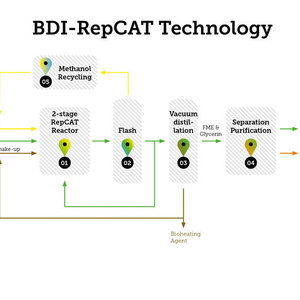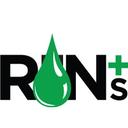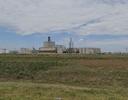Tailor-Made Biodiesel Plants

December 19, 2021
BY BDI BioEnergy International GmbH
Armed with extensive experience in international plant construction and design, BDI-BioEnergy International GmbH has high standards when it comes to innovation, product quality and environmental values.
With 70-plus projects globally and more than 320 patents, the Austria-based company says its tailor-made biodiesel plants produce high-quality fuel that meets the strictest standards. The company’s range of offerings includes all key services for the customer, from the development of new processes, scale-up, front-end, basic and detail engineering to plant construction, as well as commissioning and training of plant operators.
The cornerstone of the company’s business model is its Repeatable Catalyst technology, or RepCAT, an environmentally friendly biodiesel manufacturing process with a recyclable catalyst.
RepCAT: Recycling High-Risk Fats
Like many of BDI’s patented technologies, RepCAT is the result of long-term collaboration with local Styrian universities, which include the University of Technology in Graz and the University of Graz. Major benefits include utilization of a wide range of biodiesel feedstocks, including residual and waste materials; elimination of byproduct processing costs; as well as the ability to reuse catalysts, improving the quality of both the biodiesel and glycerin.
In April 2021, the company reached a milestone regarding its technology: BDI’s research team succeeded in gaining approval from European Food Safety Agency to use the RepCAT process for the utilization of high-risk fat materials, an achievement based on joint trials with the University Medical Center Hamburg-Eppendorf. Now, the RepCAT process can be used to produce high-quality biodiesel from highly contaminated animal fats that pose a risk to the environment. “This success reflects our constant efforts to not only provide the best technical solution for our customers, but also to positively influence the economic framework of biodiesel production so that our customers can generate a market advantage over their competitors,” says Markus Dielacher, BDI CEO.
RetroFit: One-Stop-Shop for Plant Optimization
In cases that a biodiesel plant was not engineered or built by BDI, they can still be optimized through the company’s proprietary RetroFit program. BDI has performed dozens of retrofits across the world, plant optimization projects that involved numerous steps, from initial plant evaluation, cost estimates, pre-engineering and feasibility studies, to implementation, commissioning, and aftersales service.
BDI is currently building three large-scale industrial biodiesel plants in the U.S. and Europe, which will be based on the RepCAT technology. One of those projects is Cargill’s multiwaste- and residues-based biodiesel plant, located at its existing integrated oilseeds crush and Bioro biodiesel site in Gent, Belgium. The $150 million project will be the first plant in Europe capable of processing all types of liquid waste oils and fats, including byproducts from food processing and food industry waste. The plant will have a production capacity of 115,000 tons of biodiesel annually, and is scheduled to come online in June 2022.
The ongoing development of new technologies has always been an essential component of BDI’s corporate philosophy, and to further drive that initiative, the company has established its own consulting department, GreenTech Solutions. Equipped with high-end engineering competencies and supported by state-of-the-art test laboratory and pilot facilities facilities, an interdisciplinary team of experts offers services in all phases of the technological development, from concept to market.
BDI’s development and progress have been driven by research, a core activity of the company. For over a decade, BDI has been examining algae as a sustainable energy source. Using in-house developed cultivation technology at a production site in Hartberg, BDI-BioLife Science GmbH manufactures natural premium algal recyclables that are distributed globally for use in the nutritional supplement and cosmetics industries.
But the company doesn’t plan to stop there. “We have still have a few tricks up our sleeve,” adds Wilhelm Hammer, founder of BDI. “With a new intelligent recycling technology, we’ll wage war against plastic trash.”
BDI BioEnergy International GmbH
Advertisement
Advertisement
Advertisement
Advertisement
Related Stories
Biodiesel capacity in the U.S. and Canada dipped slightly stable in 2024, with several renewable diesel producers reporting headwinds and lower margins alongside a drove of SAF projects in various stages of development.
The IEA’s Task 39 group has new research regarding the development and status of the sustainable aviation fuel industry.
The U.S. EPA on Nov. 16 released updated RIN data, reporting that nearly 2.11 billion RINs were generated under the RFS in October, up from 1.81 billion generated during the same month of last year.
Conestoga to host SAFFiRE cellulosic ethanol pilot plant
Conestoga Energy and SAFFiRE Renewables LLC announced on Nov. 16 their agreement for Conestoga to host SAFFiRE’s cellulosic ethanol pilot plant at Conestoga’s Arkalon Energy ethanol facility in Liberal, Kansas.
Officials at Calumet Specialty Products Partners L.P. discussed the company’s proposed plans to boost sustainable aviation fuel (SAF) production at its Montana Renewables biorefinery during third quarter earnings call, held Nov. 9.
Upcoming Events










